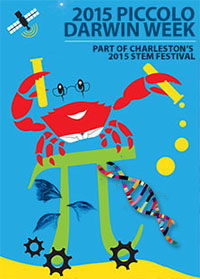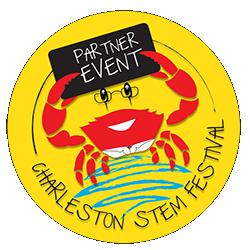Downloads
›› Information Sheet
A summary of background and program information for Piccolo Darwin Week as a two-page pdf document.
›› On-line Application
Teachers - please complete this online form...needed to reserve space for your class in the programs at
The College of Charleston, February 10 - 12.
Event Venues
Brittlebank Park
is
located on Lockwood Blvd, just south of the Joe Riley Ballpark. Parking is conveniently available.
The School of Science and Math Auditorium, College of Charleston
is located at the NW corner of Coming and Calhoun Streets, across from the CofC Library. The Auditorium is Room 129, to yourleft as you enter from Calhoun Street. The closest parking garage is two blocks south, at St. Phillips and George.
The CofC Science and Math Computer Laboratory
is located in Room 200 of Maybank Hall, in the central campus just north of Randolph Hall. Use the same parking St. Phillips Street parking garage mentioned above.
The Sottile Theater, College of Charleston
is located at the NW corner of King and George Streets, entrance on George. The St. Phillips Street garage, located two blocks west, is also the closest public parking to this venue.
A map of the CofC Campus is available online.
Darwin and STEM Education, together!
The US Science & Engineering Festival
Washington, DC
Citadel STEM Center of Excellence
A collaborative of The Citadel's Schools of Education, Engineering, and Science & Math
S2TEM Centers SC
A network of education specialists focused on economic development through improvement in K-12 STEM Education.
Darwin Week in Charleston
Our parent organization, now in its 15th year!
DarwinDay.org
The International Darwin Day Foundation, celebrating Science and Humanity.
Evolution Weekend
An opportunity for serious discussion on the relationship between religion and science, from The Clergy Letter Project.
Piccolo Darwin Week 2014
Archival site.
Evolution of the Universe... in a Necklace?
Saturday, Feb 7, 10:00 AM - 3:00 PM
Brittlebank Park
Activity leader - Ms. Amy Monsky
For all Elementary age children - No reservations required!
A
bead for the galaxies, a bead for our solar system, a bead for life,
and a
bead for us ourselves! Participants will be able to easily
recount the story of life after making a beautiful necklace of beads
highlighting the major evolutionary events. Join Ms. Amy Monsky
as she leads a
retelling of the
origin of the universe from the big bang to you.
Ms. Amy Monsky is a
mother of three, President of the Secular Humanists of the
Lowcountry, and Camp Director for Camp Quest South Carolina. She'll be leading her activity from the College of
Charleston tent at the STEM Festival.
A Walk Through Time
Tuesday, Feb 10,
11:15 AM - 12:45 PM [36 seats still available!]
Thursday, Feb 12,
11:15 AM - 12:45 PM [Registration closed]
Mace Brown Museum of Natural History
CofC School of Science & Math Building
Mr. Mace Brown and Ms. Lauren Humphreys
For Grades 7-12, Reservations Required.
What better way to tour the Mace Brown Museum of Natural History than with Mace Brown himself? Mace and his esteemed colleague Lauren Humphreys will lead students on a tour of this gem of a museum, beginning with stromatolites, the oldest fossils on earth, winding through fossils representing billions of years of adaptations and evolutionary changes, finishing at the cave bear display. Also tour the newly-opened Evolution of Whales Exhibit and the "prep room" where fossils are prepared for exhibit.
Mace Brown is a Mt. Pleasant businessman who has collected fossils most of his life. He donated his entire collection of over 3,000 items to the College of Charleston and now teaches a class at the College in fossil preparation and curation. Ms. Lauren Humphreys is an Adjunct Professor in the Geology Department at the College of Charleston. She is a College of Charleston graduate, and majored in Anthropology with a minor in Geology.
A Whale of A Tale [Still open!]
Tuesday, Feb 10, 1:45 - 2:45 PM
Thursday, Feb 12, 1:45 - 2:45 PM
Sottile Theater
Dr. Jonathan Geisler
For Grades 7-12, Reservations Required.
In this program, students will compare and contrast living whales and dolphins (Order Cetacea) with distant relatives like hippos, cows, and deer. Working in groups, they will develop hypotheses for how many of these differences are best explained as aquatic adaptations that evolved in cetaceans. They will then learn about the amazing fossil cetaceans of the Charleston area and how they bridge the anatomical gap between cetaceans and other mammals.
Dr. Jonathan Geisler is Associate Professor of Anatomy at the New York Institute of Technology (Old Westbury) and Research Associate at the National Museum of Natural History. He received bachelor's degrees in geology and biology from the College of Charleston and his Ph.D. from Columbia University. He is an expert on the evolution of the Cetacea, emphasizing insights obtained by integrating observations from living and fossil species. While Curator of Paleontology at the Georgia Southern Museum, Dr. Geisler taught K-12 school children attending summer museum programs and developed hands-on educational activities that matched state science standards. He has collected and studied fossil whales of the Charleston area for over 15 years.
Hands-on Simulation with Artificial Life
[Registration Closed]
Wednesday, Feb 11, 1:00 - 2:15 PM
CofC School of Science & Math Computer Laboratory
Dr. Garrett Mitchener
For High School Students, Reservations Required.
Begin with a dish of virtual organisms. Observe how they respond to challenges in their environment. As they reproduce, mutations can occur, some of which lead to new abilities. We'll see instances of invasive species, punctuated equilibrium, and other complex ecological behavior. Thanks to the Avida software, we can see evolution happen in a matter of minutes, and observe in detail what has occurred.
Dr. Garrett Mitchener is an associate professor of mathematics at the College of Charleston. He earned his bachelor's degree from Duke and his PhD from Princeton. His research is in probability and dynamical systems, with applications to biology and linguistics. He is particularly interested in how neurons perform computations, and how human language evolves on both biological and historical time scales.

